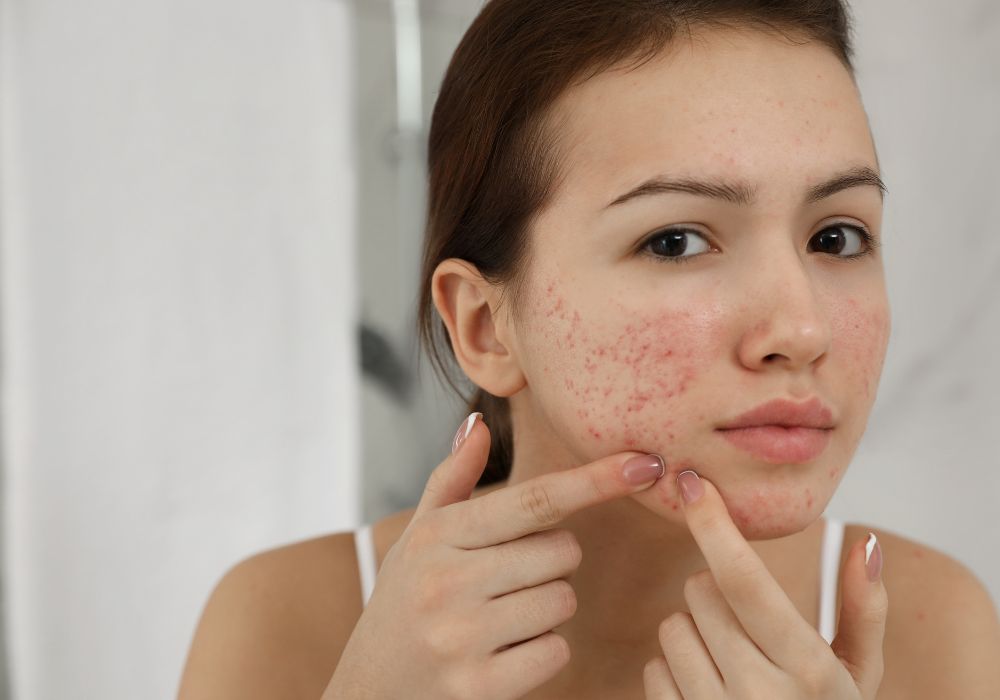Acne. Ugh! We’ve all been there – staring at those angry red bumps in the mirror, wishing they’d magically vanish. While the latest acne-zapping creams and treatments can sometimes work wonders, they can be harsh on your skin and your wallet. What if I told you that some of the best acne fighters might already be in your kitchen? Let’s dive into the world of natural acne solutions and how to find what works for you.
Understanding Your Skin’s Grumbles
First things first – why do we even get acne? It all comes down to a few things:
- Overactive oil glands: Your skin has tiny oil glands called sebaceous glands that keep it moisturized. Sometimes they go into overdrive, producing too much oil that clogs your pores.
- Clogged pores: Dirt, dead skin cells, and that excess oil can get trapped inside your pores, creating the perfect environment for acne bacteria to thrive.
- Inflammation: Your body sees those clogged pores as an attack and sends in its army of white blood cells to fight back. That’s what causes the redness and swelling of a pimple.

The Gentle Power of Natural Ingredients
Sure, I know those commercials with laser beams battling zits sound cool, but harsh chemicals can irritate your skin further and sometimes make the problem even worse! Nature has some surprisingly powerful ingredients that can help calm your skin, fight bacteria, and clear those stubborn pimples without that burning sensation. Let’s take a look at a few:
Tea Tree Oil: The Superhero
It might smell a little strong, but tea tree oil has been a natural acne remedy for centuries. It has antibacterial properties, meaning it can help zap those pesky acne-causing bacteria. Plus, it acts as a natural anti-inflammatory to soothe redness and irritation. Just remember to dilute it – a little goes a long way!
Aloe Vera: The Soother
Ah, the cooling gel from the aloe vera plant is legendary for calming sunburns, but it can do wonders for irritated, acne-prone skin too! It has both anti-inflammatory and antibacterial properties, helping to reduce redness and prevent new breakouts. You can use pure aloe vera gel, or look for skincare products containing it.
Honey: Nature’s Sweet Healer
If Cleopatra used it for glowing skin, you know it must be good! Studies like the one published in the Journal of Dermatology & Dermatologic Surgery show that honey has some serious acne-fighting potential thanks to its natural antibacterial and anti-inflammatory properties (Ahmad (2017), “The use of complementary medicine among acne valguris patients: Cross sectional study”]). It’s a great option if your skin tends to be sensitive.

Creating Your Natural Acne Routine
Here’s the thing: not every natural remedy works for everyone. What healed your best friend’s breakouts overnight might not do much for you. Remember when I was a teenager? Desperate times called for desperate measures…which sometimes involved toothpaste on my pimples. It did nothing except give me minty-fresh breath right next to my zits! So, a little patience is key. Here’s how to get started:
Step #1 – Patch Test: The Golden Rule:
Before using any new ingredient on your entire face, test it on a discreet area like the inside of your wrist or behind your ear. Wait 24 hours to check for any irritation. This is especially important if you have sensitive skin or known allergies.
Step #2 – Start Slow: Baby Steps to Clear Skin:
Introduce one new natural ingredient into your routine at a time. This lets you see how your skin responds and pinpoint any potential irritants. If everything goes well for a week or two, you can gradually add another ingredient to your regimen.
Step #3 – Be Consistent: Patience is Key:
Natural remedies often work more subtly than their chemical-packed counterparts. Don’t expect overnight miracles – give each ingredient a fair chance, typically at least 2-3 weeks, to show its effects before deciding if it’s right for you.
Step #4 – The Basics Still Matter: The Foundation of Healthy Skin:
Natural acne remedies work best when combined with good skincare habits. Cleanse your face gently twice a day with a mild cleanser, moisturize regularly, and don’t skip sunscreen (even if it’s cloudy!). Remember, healthy, balanced skin is more resilient and better able to handle any acne flare-ups.
Step #5 – Listen to Your Skin: It Speaks Volumes:
Pay attention to how your skin feels after using a new natural ingredient. Does it feel soothed and refreshed, or tight and itchy? Burning, stinging, and excessive redness are signs to stop using that particular ingredient. Your skin will guide you towards solutions that work best.
A Word about Expectations
While natural methods can be amazing, don’t expect overnight miracles. And if you have severe or cystic acne, it’s always wise to see a dermatologist. According to sources like Healthline, natural remedies are great additions to your routine, but they might not give the same immediate results as prescription medications ([Klein, Erika (November 3, 2020), “Fight Acne With These Simple At-Home Remedies”])
Acne and You
Acne can really get you down, making you feel self-conscious and frustrated. But remember, you are not alone! Be kind to yourself as you try these natural solutions and find what helps your skin shine.

